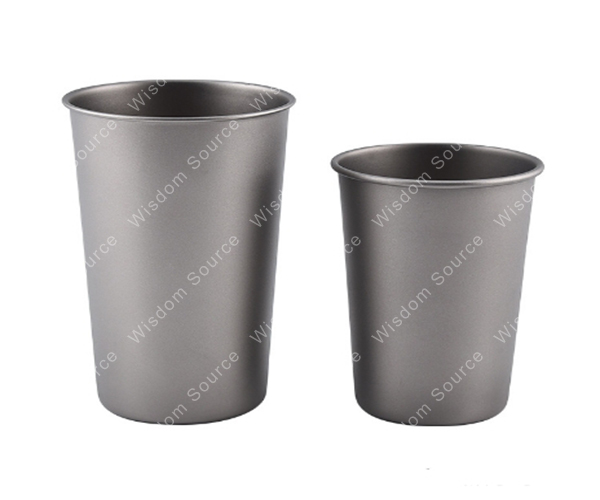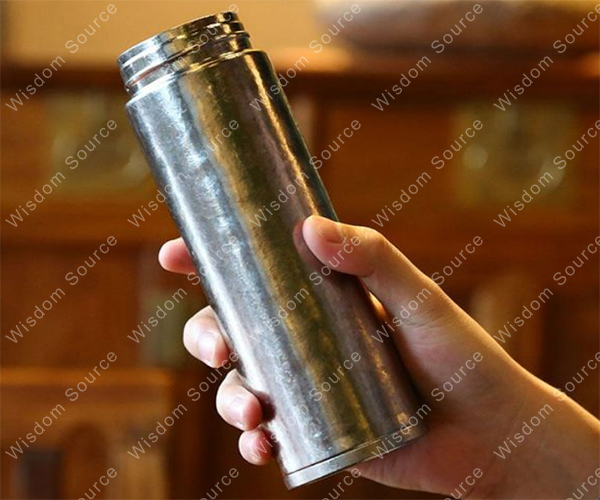Application Scenarios Of Titanium Alloy Cups: From Office Health To Outdoor Multi-Functional Technology Empowerment
Application Scenarios Of Titanium Alloy Cups: From Office Health To Outdoor Multi-Functional Technology Empowerment
With its lightweight, corrosion-resistant and bio-compatible properties, titanium alloy materials are penetrating from high-end fields such as aerospace and medical care to consumer goods. Among them, titanium alloy cups have become a typical case of high-performance material applications by accurately matching the needs of office, outdoor and other scenarios.
1. Office Scene: The Integration Of Healthy Drinking Water And Industrial Aesthetics
1. Health Attribute-Driven Application
1) No metal precipitation and antibacterial properties: Titanium alloy will not release harmful substances when exposed to acidic beverages (such as coffee and tea), and the surface antibacterial rate is over 99%, which is suitable for the workplace population's demand for healthy drinking water.
2) No odor residue: compared with traditional metal cups, titanium alloy cups can avoid odor problems after long-term use and improve the use experience.
2. The Design Language Fits The Office Aesthetics
Cold metallic texture: The gray-silver luster and minimalist design style of titanium alloy have become the carrier for urban white-collar workers to express a sense of “relaxation” and “advanced”. Some brands have launched customizable lettering services to meet individual needs.

2. Outdoor Scenes: Technological Breakthroughs In Lightweight And Versatility
1) Lightweight design reduces weight
Density advantage: The density of titanium alloy is only 60% that of stainless steel. Taking 300ml capacity cups as an example, its weight is about 40% lighter than stainless steel products, which significantly reduces the burden on backpacks in hiking, mountaineering and other scenarios.
2) Corrosion resistance and high temperature resistance
Acid-base corrosion resistance: When titanium alloy comes into contact with acidic liquids such as fruit juices and carbonated beverages, the surface is not easy to be corroded, prolonging its service life.
Open flame direct burning compatibility: Some titanium alloy cups and utensils support direct heating on a bonfire or stove to meet the needs of outdoor boiling and cooking.
3) Multi-functional integrated design
One thing is multi-purpose: through the design of detachable handles, folding cup lids, etc., titanium alloy cups can double as water bottles, tableware and even small cookware, reducing the number of outdoor equipment.
3. Kitchen Scene: From A Single Vessel To The Whole Scene Expansion
1) Corrosion resistance, suitable for complex cooking
Anti-salt spray and anti-oil pollution: When titanium alloy comes into contact with high-salt and high-oil ingredients such as seafood and soy sauce, the surface is not easy to rust or absorb oil stains, and the difficulty of cleaning is significantly reduced.
2) No metal precipitation to ensure food safety
Stability of acidic environment: When storing acidic foods such as lemon juice and ketchup, titanium alloy will not release heavy metal ions to avoid food safety hazards.
3) Environmental attributes promote sustainable application
Recyclability: The recycling rate of titanium alloy materials is as high as 90% or more, and some brands have launched “trade-in” services to extend the product life cycle.

4. Challenges And Optimization Directions Of Technology Empowerment Scenarios
1) Thermal insulation performance needs to be improved
Heat conduction characteristics: The high thermal conductivity of titanium alloy causes its thermal insulation effect to be weaker than that of stainless steel. Some brands improve this problem through double-layer vacuum structure or cup wall coating technology.
2) Contradiction between processing cost and scale
Precision machining difficulty: Titanium alloy has high hardness and easy to stick to the knife, which leads to large mold loss and long processing time. It is necessary to reduce costs through automated production lines and material modification technologies.
3) Innovation needs under homogenized competition
Design differentiation: With the expansion of the titanium alloy cup market, brands need to avoid product homogenization through innovations such as color processing (such as anodizing) and functional modularity (such as replaceable cup lids).
The expansion of the application scenario of titanium alloy cups is essentially a manifestation of the deep combination of high-performance materials and consumer demand. From the health attributes of office scenes to the lightweight requirements of outdoor scenes, to the food safety considerations of kitchen scenes, titanium alloys are reshaping the value boundaries of daily utensils through the precise matching of technical characteristics and scene-based design. In the future, with the advancement of material modification technology and manufacturing technology, titanium alloys are expected to be used on a large scale in more consumer fields.
